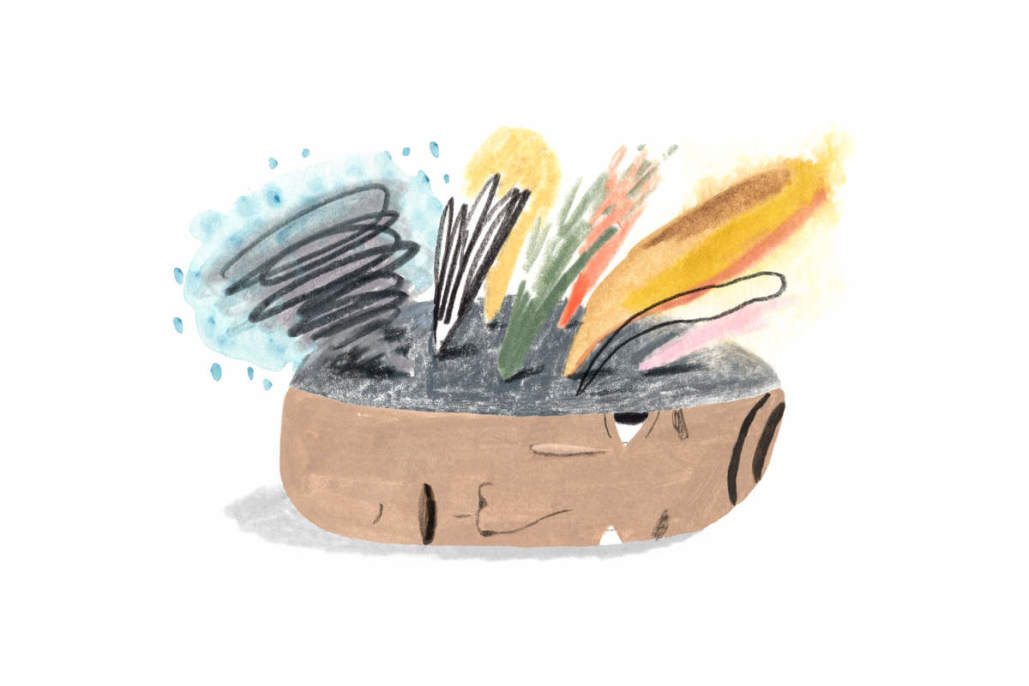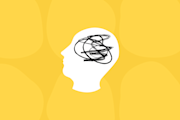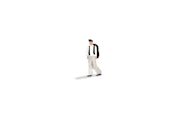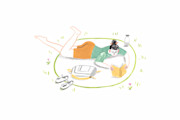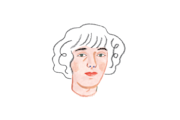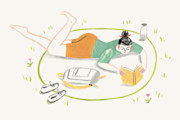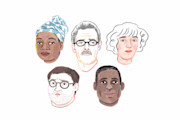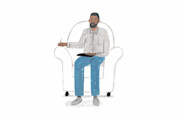The first time I had a panic attack, I was 11 years old. I think I was in social studies when I started feeling that clammy, tingling feeling on my scalp that tells me I’m going to vomit. I snapped up the bathroom pass and darted to the girls’ room, fully expecting to puke up my lunch. Instead, I had what I thought was a heart attack.
The clammy feeling spread down my neck and face, making my chest feel both incredibly hot and incredibly cold; the nausea seemed to expand like a balloon in my stomach without ever making it into my mouth, which was gulping for air like a fish on dry land. My heart had either stopped beating or was beating so fast as to be undetectable.
The walls of the bathroom stall cracked in half and the floor fell out from underneath my feet. I felt like I was being stabbed in my lower back and my heart at the same time (I had recently read The Lion, the Witch, and the Wardrobe; I remember I was picturing being stabbed with icicles by the White Witch). And I knew I was dying. Even as I write this, decades later, I still feel it: It’s not that I felt like I was dying, I knew I was dying.
At the worst, I was having two or three of these “heart attacks” a day.
It’s been a while since then. I grew up, and my panic attacks have changed, too. Mercifully they are now rare occurrences. With practice, I got to a place where I can see a panic attack on the horizon and try to maneuver myself into privacy. The biggest difference is that now, instead of knowing I’m dying, I am overwhelmed by the feeling my life is over—a strangely enormous difference.
The one thing that hasn’t changed is the intense urgency I feel, a sort of apocalyptic fear.
Panic attacks can be hugely disruptive to a person’s life. When I was little, I was laid out for hours after a panic attack, so completely exhausted from the tidal wave of adrenaline I couldn’t keep my head upright. As I’ve gotten older, panic attacks have occasionally prevented me from feeding myself.
Though there is clinical consensus on what, exactly, a panic attack is, they are also defined by their subjective nature. That is, different people can experience panic attacks differently.
Below, we asked several people to describe what a panic attack feels like to them. (Names have been changed.)

Phil, 34
For me, it felt like a powerful need to escape. I felt more or less like my fight-or-flight response kicked in, and I’m not much of a fighter, so I felt almost like I was in danger and needed to run. Not run to find help, more like to get away from this really overwhelming feeling of “something isn’t right” discomfort.
I’m sure I was breathing fast and my heart was beating quickly, but it didn’t feel like the “holy shit I’m dying” panic attacks you see in movies; I never had that thought that I was dying, I just felt like I was in a situation that was unsafe and completely out of my control and I wanted to get away, but I couldn’t really. I did physically move and it didn’t really let up.
Alison, 29
I’m honestly not sure if I have had one. I have been anxious to a degree that I need to curl up in bed and just focus on breathing. But I’m not sure that’s a full panic attack. Is it?

Angela, early 40s
I’ve had a few of them over the years. Usually it feels like a 747 jumbo jet is taking off inside my chest. There’s a rush of...well, panic, and all the adrenaline that comes with it. My mind goes a little dark or blank. I can’t move. All I can do is try to stay alive, if that makes sense? It feels like everything is going to end, to just go black, and I am gulping for air.
Sometimes I cry. Usually I just try to lie down and do nothing until it subsides. And then afterward, hours later or the next day, I am SO tired. The comedown after the adrenaline rush, I guess. I feel so nauseous after, it takes a full day or so before I can eat a real meal again.
It feels like everything is going to end, to just go black, and I am gulping for air.
Jules, 32
During the first one I had, I thought I was having an allergic reaction to something. It happened while I was driving on the Long Island Expressway in the rain. The rain had come on quickly and despite feeling like I was driving through a literal wall of water; I wasn't scared. Foul-weather driving has never bothered me. When the downpour stopped, the late afternoon sun illuminated the spray that was being propelled from other drivers' tires into the atmosphere and it was truly psychedelic; I couldn't tell what was road, what was air, what was water—everything was just bright.
I was happily listening to music, thinking what a neat experience it was to drive in this weird spray when I noticed I was having a lot of trouble swallowing. It was almost like my mouth and throat were “misfiring” swallows. My tongue felt fat and in order to get saliva down, I had to make these sort of lapping motions with my mouth, smacking my lips together and pushing my tongue forward and backward along the roof of my mouth.
It was unsettling. I could not understand what was going on; nothing like that had ever happened to me before.
I was just waiting for the moment I'd snap and call an ambulance.
So I just kept driving, trying to find music to distract me. Eventually it stopped, though it happened a few more times that week during moments when I should have felt comfortable or relaxed, like at a family dinner. I also noticed a restlessness in conjunction with the short breath/weird swallow experience and would have to pace around or find something to do with my body.
Years later, I had the worst panic attack I've ever had and thought I was having a heart attack. I felt the now-familiar physical and mental restlessness panic attack cues. But I hadn't yet learned how to attempt to talk myself down from the ledge. It was January and like 12 degrees out but my heart was beating out my chest, I was sweating and my face was so dang hot I felt insane and ill. I was just waiting for the moment I'd snap and call an ambulance.
I felt so claustrophobic I couldn't be in the apartment anymore so I darted outside in slides and a hoodie and walked around the block three times hoping some cold air and movement would Make It Stop. By my third lap in subzero weather I was feeling hot and cold and like I was going crazy.
I called [my boyfriend] and tried to tell him I felt sick and freaked out, but when I opened my mouth, I was just kind of crying and screaming. He rushed over and tried to walk with me and talk to me. I knew I was acting crazy because I saw how scared he looked.
I couldn't stop running and was running into the streets. He grabbed me and hugged me and told me everything was fine and we went back upstairs. I was in bed for the next three or four hours intensely monitoring the pace of my heart. The true uncontrollable panic was over but I was so terrified it would come back that I was paralyzed.
That moment changed me! The fear of that kind of mental crisis taking over my body had me in a panicked state for the better part of that year.

Megan, 37:
When I get a panic attack, it starts with feeling extra sensitive to sounds around me. I get jumpy and my heart starts racing and I feel like I’m about to crawl out of my skin. Each breath is more shallow and faster than the one before. I get so anxious I can’t think straight.
I’m basically useless when this happens. When I feel it coming on, I try to breathe and relax...but klonopin is always a good option if that doesn’t work.
Laura, early 40s
I’ve had them for years. Only recently figured out what they were. Last one was after [a traumatic incident]. I couldn’t talk. Teeth were chattering and I was violently shaking for two solid hours. My husband was ready to take me to the hospital until I could finally get out “Go get my klonopin.” I just could NOT catch my breath. I was lightheaded. It was so scary.

Paul, 43
I don’t remember what it was about, but I remember I was in seventh or eighth grade. I remember fritzing out so completely my dad had to lay me down in the bathroom and put a cold compress over my face. It was a little like the asthma attacks I’d had as a kid, but without that hairy feeling in my chest. Lots of hurried, shallow breaths.
If any of the above sounds familiar, you may have had a panic attack. While there are varied subjective experiences of a panic attack, most psychologists agree that experiencing four of the following 13 symptoms in a ten-minute period qualifies as a panic attack.
The symptoms are:
Palpitations, pounding heart, or accelerated heart rate
Sweating
Trembling or shaking
Sensations of shortness of breath or smothering
Feeling of choking
Chest pain or discomfort
Nausea or abdominal distress
Feeling dizzy, unsteady, lightheaded, or faint
Derealization (feelings of unreality) or depersonalization (being detached from oneself)
Fear of losing control or “going crazy”
Fear of dying
Paresthesias (numbness or tingling sensation)
Chills or hot sensations
The good news is that panic attacks are very common and highly treatable. Talk therapy, particularly cognitive-behavioral therapy (CBT), has proven to be especially effective in treating panic attacks. There are also prescription medications designed to treat panic disorders and panic attacks.
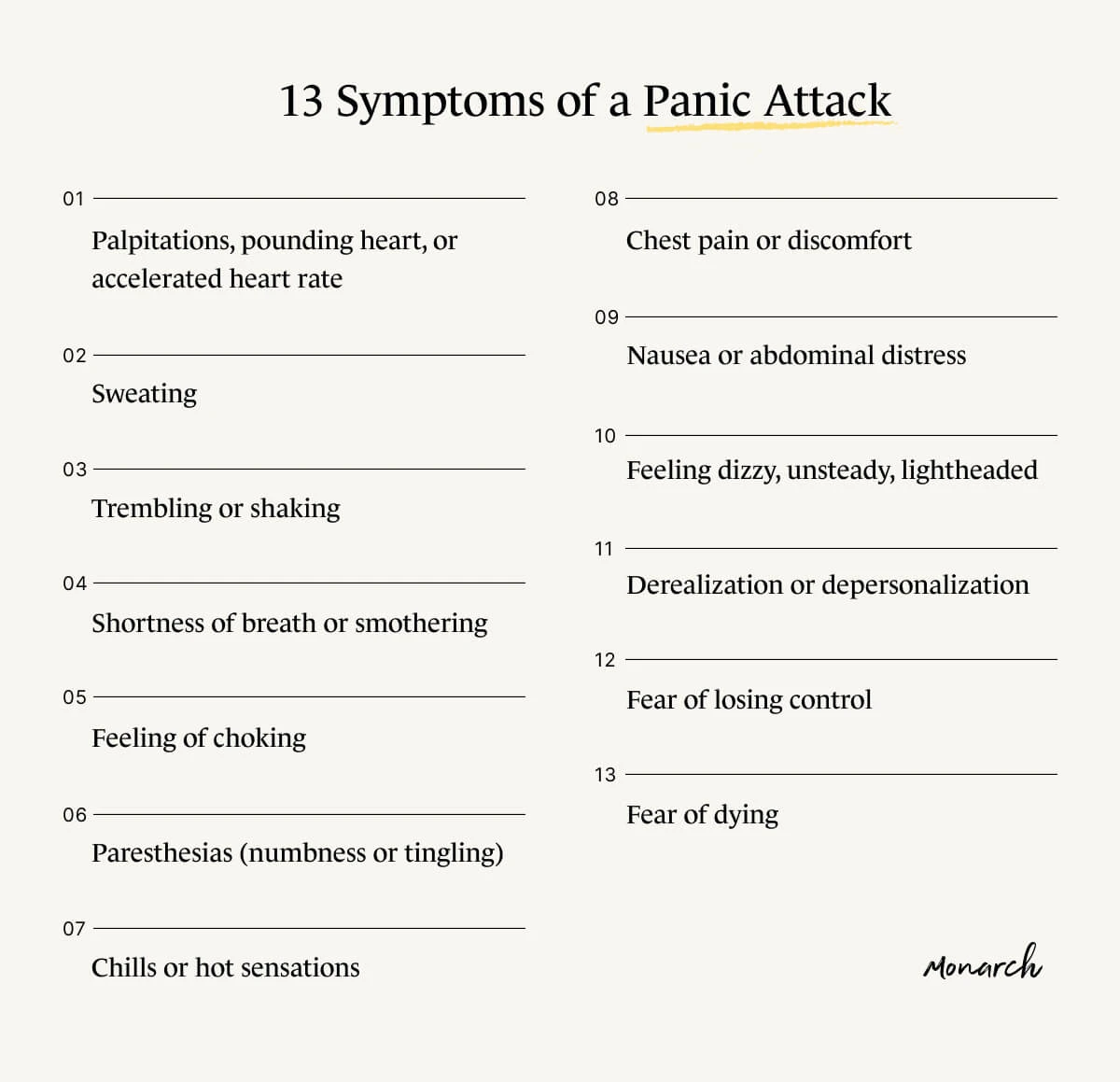
Anxiety quiz
To help you determine if you have symptoms of an anxiety disorder, take Monarch’s two minute, free anxiety quiz. Taking the anxiety quiz can help you monitor your mental health.
American Psychiatric Association. (2013). Diagnostic and statistical manual of mental disorders (5th ed.). Washington, DC: Publisher.
